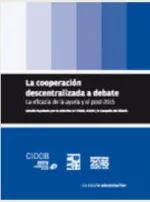The debate on decentralized cooperation: aid effectiveness after 2015. Perspectives from Spain

Within the framework of the effort of coordination and dynamization of actors and networks of decentralized development cooperation carried out by the UNDP-ART antenna at the Barcelona Centre for International Affairs (CIDOB), in early 2012 it was considered timely to commission commended experts with a series of field studies about the state of the art of the decentralized cooperation and aid effectiveness debate. Taking the Spanish and particularly the Catalan experience as a case study, the research process culminated in the writing of preliminary reports that then were discussed internally and debated in a seminar held in Barcelona in September 2012.
Positioned squarely in the post-Busan paradigm and in the studies that are being carried out at different levels in order to contribute to the future global development agenda beyond 2015, the seminar confirmed the existence of a shared awareness, not only of the need for a change in the model of development assistance, but also of the opportunity of carrying it out as a strategy to emerge stronger from the current crisis by means of a greater coordination among the actors of decentralized development cooperation.
A reading of the results of this process of research, reflection, and discussion demonstrates the need to increase the efforts invested by all the agents of decentralized development cooperation with the ultimate objective, which all share, of providing a more inclusive model, one in which the role of emerging countries, civil society, the private sector and sub state agents will be recognized.
The present research document, published jointly by CIDOB, UNDP-ART and the United Nations Millennium Campaign, aims to make a modest contribution to guarantee the strategic alliance forged on the road to the Busan Forum. Its objective is to continue to promote multilevel dialogue, accompanying the processes of reflection on the efficacy of development cooperation and following up on the Rio+20 accord. The document feeds on the process of consultation and proposal for a post-2015 agenda in which the contribution of these distinct actors will be the foundation for continuing to perfect a long-term action for development.
136 pp.